What's The Difference Between Organic and Non-Organic SEO?
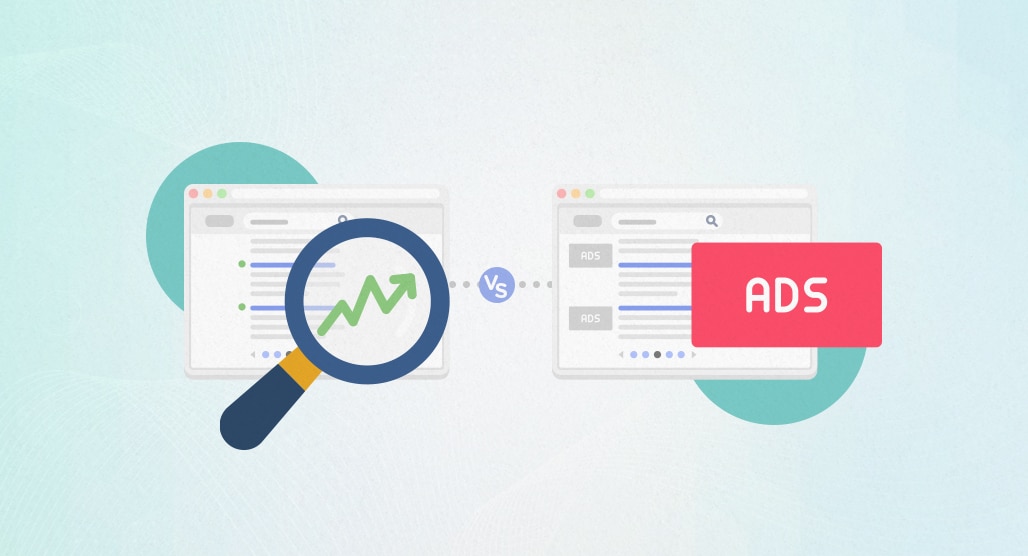
In marketing, you often seen the term "organic" thrown around to describe various kinds of techniques and mechanisms for growth. It doesn't have much to do with the use of pesticides in your marketing; rather, it's a way to describe the difference between growth that happens naturally, and growth that happens unnaturally.
What does that mean, though?
 30 Second Summary
30 Second Summary
You have two main ways to think about organic SEO. First, you can view it as any marketing that isn't paid ads - like content creation and social media. Second, you can see it as techniques that follow Google's rules versus artificial methods that break them. While organic SEO takes longer to show results, it builds lasting value. You'll want to mix both organic and paid methods based on your budget and goals, focusing on what works best for your situation.
There Are Two Different Definitions
Organic is brought up as a way to describe a particular set of marketing techniques, all centered around natural growth you get from following the rules, playing nicely, and avoiding anything artificial. In that sense, it's similar to how the term is used in, for example, food products. Except, like with food products, it can kind of mean different things to different people, and it's all about what it's being compared to.
So, let's talk about organic versus non-organic or inorganic SEO along both of those axes, and see how they all compare.
Organic vs Paid SEO
The first way to compare organic SEO is versus paid SEO. This is the more common of the two definitions, so it's the one you see most when you research this kind of topic.
In this comparison, organic SEO is the collection of techniques you use to grow through Google's algorithm, and end up in the "natural" search results. That is, not the ads.
Paid SEO, by contrast, is simply paying for placement in the search results page. Specifically, that just means paid advertising. Paying for visibility and discovery in the Google search results, the Google news and trends pages, on YouTube, and other channels, all is collectively known as PPC or Pay-Per-Click advertising.
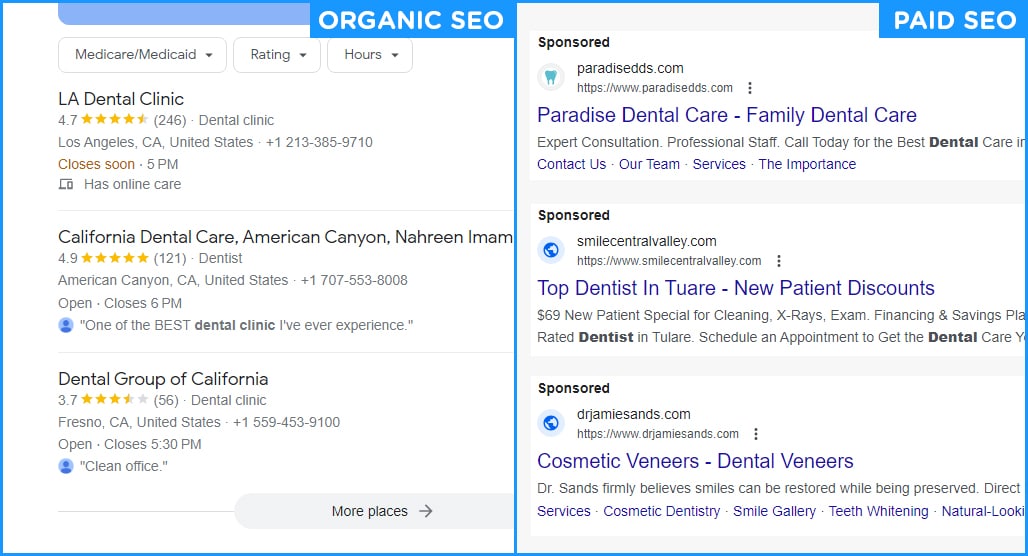
One thing that doesn't come up in this discussion is the legitimacy of the techniques you use. Paid SEO in this case is generally viewed as legitimate, because there's no real way to use Google Ads without paying Google money for placement, and Google's reviews are tough enough that you can't lie about your content or your site and expect to run your ads without either taking a massive hit to your quality score or being prohibited.
On the organic side, though, you can use all the "good" and all the "evil" techniques you want, as long as they aren't paid ads. Paying for backlinks, paying for guest post spots, paying for influencer shoutouts; things that would normally be considered to be "gray" in morality or even outright misrepresentations aren't outside the realm of organic techniques.
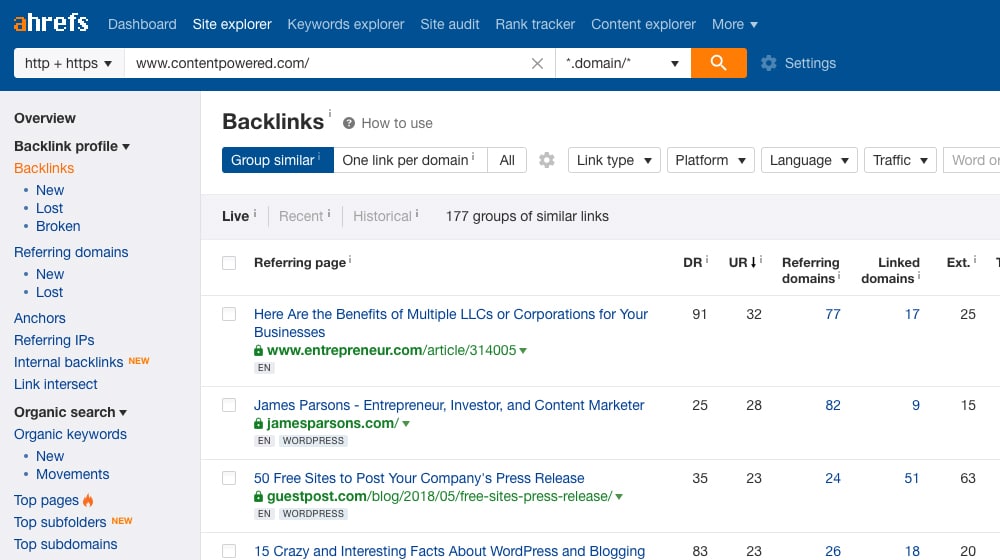
This does, however, bring up another schism in the discussion:
- To some people, organic SEO is synonymous with white-hat or positive/good SEO. It's the website infrastructure, the keyword usage, the up-front backlink building, the social media marketing, the high-quality content production, and the legitimate networking.
- For others, it just means anything that isn't paid. Some people would consider paying an influencer for a shout-out to be paid marketing; others consider it organic because it's not paying directly for placement in Google's search results. Others will tell you it depends on whether or not the influencer discloses their sponsorship.
- Organic SEO generally has a lot of benefits. It's very long-term useful if you do it right, and continues to grow and compound upon itself over time. It might take years before you see real growth, but once you start growing, you tend to keep growing. Conversely, paid SEO works very well immediately, and stops working immediately when you stop paying. Money in = high placement. No money, no placement.
Organic SEO is also often considered, while not free or cheap, at least efficient with the money you spend. If you spend $500 on a bunch of ads and get a bunch of traffic that doesn't convert and doesn't come back after the $500 is gone, well, you might as well have wasted that $500. Conversely, if you spend $500 on a really good piece of content, that piece of content can exist, rank, and bring in traffic with the potential to convert for years to come.
For this comparison, you can examine any technique and determine whether it's organic or paid based on how it functions. Paid SEO is paying directly for placement in the search results. Anything else is organic.
Shifting the Definition
The alternative here is to be more balanced. You can consider anything in the general PPC umbrella as paid SEO, and anything outside of it as organic SEO.
When you do this, it means paying for ads on YouTube, paying for ads on Bing, paying for display ads on websites and display networks, paying for social media ads; these are all then considered Paid SEO. Things like social media posting, blog content, and keyword usage are all still organic techniques.
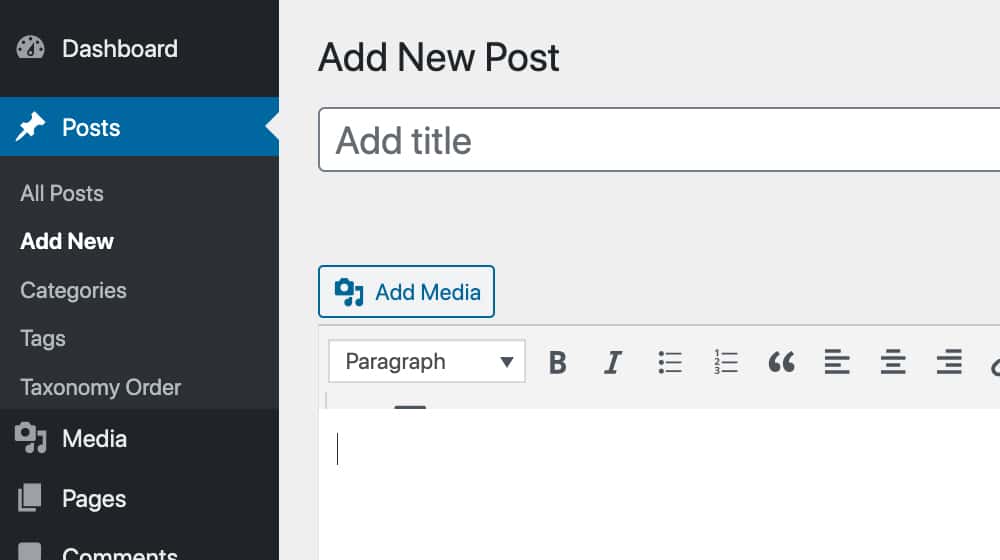
The tricky part with this version of the definition comes from things that aren't quite traditional PPC, but also don't quite fall under the organic umbrella. Paying influencers is a big one, as is paying for sponsored content spaces, or paying for backlinks. While technically paid marketing, they aren't traditional PPC, so they don't quite meet the definition of paid.
Some people use money as the dividing line; anything you pay for is paid marketing, and anything you don't is organic. I don't like this definition, and you can probably guess why; a lot of money can go into things people don't think of as being paid for. Running a blog can cost you:
- Paying a writer for high-quality content.
- Paying a company for keyword research and ideas.
- Paying a graphic designer for images.
- Paying an assistant to handle publishing.
- Paying an editor for a fact-check and thorough review.
All of this is money involved in a blog post, so it's hard to call a blog post free.
So, another alternative is things you can do for free, even if you don't. You can build backlinks, write blog posts, create images, publish content, and network for mentions from influencers all without putting a dime into it. It'll be a lot harder, a lot slower, and a lot less effective, but you can. Meanwhile, something like Google Ads is completely, utterly, 100% inaccessible without paying money (as long as you ignore that signing up for Google Ads often gets you some ad credits, so you can do some ads for free…)
All of this comes down to where your personal views on the details are. And, truthfully, 99% of the time it doesn't really matter what label you apply to it. Some people might quibble and argue about it, and you know what? That's fine; those arguments, those comments, that's engagement, baby.
We create blog content that converts - not just for ourselves, but for our clients, too.
We pick blog topics like hedge funds pick stocks. Then, we create articles that are 10x better to earn the top spot.
Content marketing has two ingredients - content and marketing. We've earned our black belts in both.
Leave a comment if you agree, disagree, or just want to argue!
Organic vs Artificial SEO
Another way to look at organic SEO is through the lens of artificiality. How much of what your marketing is doing is honest?
This, too, has different versions depending on how you look at it. The two biggest are money (again) and morality.
- Money brings us back to what I was discussing above. Organic SEO is SEO you can do for free, and don't need to pay for. For the stricter among us, it's the SEO you don't pay for, even if you could, and any time you pay for it, it makes it artificial.
- The morality one is the more interesting divide to discuss. For this, organic SEO is any SEO that plays by the rules, and artificial SEO is SEO that doesn't. It's sort of a way to rephrase white-hat and black-hat without being reliant on outdated terminology.
In this sense, building a blog is organic SEO, but using AI to spin up copies of existing content is artificial. Paying an influencer for a shout-out is organic if they disclose it, but artificial if they don't. Building backlinks can be organic if you're doing it naturally through quality content and outreach, and artificial if you're paying for link placement.
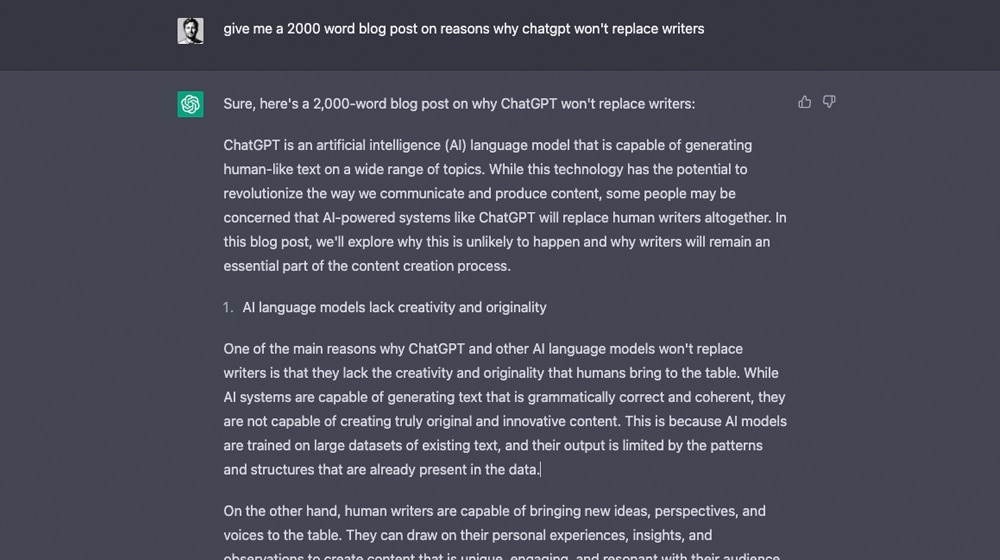
In this dichotomy, there's sort of a sliding scale. Organic SEO is all the best stuff, the good and moral and legal actions you can take to build up a reputation, earn brand exposure, and grow your rankings through sheer power of quality, presence, and determination.
On the far end of the scale, then, are the so-artificial-it's-robotic techniques. Comment spam, paid links, and other kinds of techniques that are clearly violating Google's rules and could get you banned if they found out are the most artificial of the artificial techniques.
Then in the middle, you have the things that may be a little sketchy, but aren't outright violating the rules. Or, in some cases, the techniques that violate the rules, but are nearly impossible to detect and punish, or that "everyone" does. Paying for a sponsorship without that sponsorship being disclosed is technically a violation of FTC guidelines… but offering a free copy of a product in exchange for an "honest review" is just fine. Sending a nice follow-up thank-you card with a gift card after a positive review just reinforces it, and there's nothing wrong with expressing gratitude.
Like everybody else, you'll have to find a balance that you're comfortable with.
What's the Best Kind of SEO?
The best kind of SEO is the SEO that works.
Whether that means organic, artificial, paid, free, or (more likely) a combination of all of it, it doesn't really matter.
Truthfully, nothing in marketing is ever free. While you can do some things without spending money to do it, there are always, always ways to speed it up, make it more efficient, or make it more effective by spending some money.
I'm not an unethical marketer. I stay away from the so-called "black hat" techniques that involve buying shady links, working with private blog networks, undisclosed financial incentives, and spam. I write myself and I pay writers, I pay for high-quality tools, I write my own code, and I earn my ranking the hard way.
Organic marketing is effective, when you do it right. Paid marketing is also effective.

Unethical SEO is, distressingly, also effective; it just has the very significant downside of, if you're detected, having your site nuked from the search results until you knock it off.
The real truth, as you might expect, is that you need to do a mix of everything within your own tolerances.
- Build a strong website with stable, fast-loading, well-coded infrastructure and a good user experience on both desktop and mobile devices.
- Build a blog with a ton of content, regularly updated, and focus on using keywords within your niche and topic that have the right balance of traffic to competition.
- Build a community by engaging with your readers, encouraging comments, responding to comments, and even performing outreach, guest blogging, and other networking.
- Pay for display ads on websites and for PPC ads both on social media and other sites, and directly in the Google search results.
- Work with influencers and other authorities to build relationships, backlinks, and shout-outs; whether or not money, products, or other incentives change hands is up to you.
- Pay for tools and contractors to make your job easier, more efficient, faster, or higher quality than you can do on your own.
And, of course, all of this changes and grows over time. When you're first starting out, with a budget of $10 and a piece of twine, you're going to be operating on a very different scale than once you've got regular income from your site to reinvest.
The best SEO is the SEO that works, for you, with the skills, resources, and options you have available to you. What, exactly, that means for you? Well, that's a whole other discussion, isn't it?
Have any questions about organic or non-organic SEO? Feel free to express them in the comments. I'd love to start a a constructive discussion on the subject!



 30 Second Summary
30 Second Summary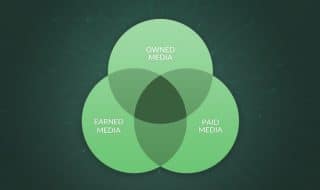
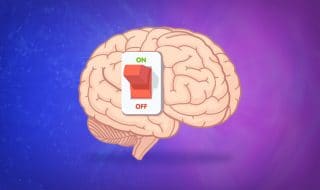

Comments